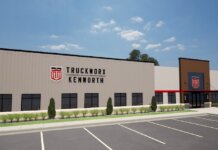
Electrification is sweeping through the nation’s automobile manufacturing industry, and nowhere is that more apparent than in West Alabama, home of the sprawling Mercedes-Benz U.S. International (MBUSI) plant and the University of Alabama.
The university’s board of trustees last November approved forming the Alabama Mobility and Power Center (AMP), planned as a world-class research and development hub for creating and sustaining modern mobility and power technologies, developing vehicle charging infrastructure and managing power delivery to support large-scale growth in electric vehicles.
At the same time, MBUSI is undergoing a $1 billion expansion to support electric vehicle production, and other auto manufacturers in the state are embracing this technology as well.
“Mercedes-Benz is getting ready to go all electric by the end of the decade where market conditions allow and we are moving swiftly toward an emissions-free and software-driven future,” said Michael Goebel, president and CEO of Mercedes-Benz U.S. International Inc., according to a UA news release.
“Our location here in Alabama is among the Mercedes-Benz locations on three continents that next year will build electric vehicles and highly efficient battery systems. Our partnership with the University of Alabama and Alabama Power through the AMP Center is a collaboration that will help position Alabama to be a leader in electric vehicle innovation.”
The AMP Center will be organized under the Alabama Transportation Institute at UA and housed in the recently approved Smart Communities and Innovation Building.
The emphasis on electrification played a major role in shareholders’ approval to split Mercedes parent company Daimler into two independent companies by spinning off its truck and bus division. The company anticipates the split will give both companies the freedom to operate better in a fast-changing environment focused on zero-emission vehicles and software.
According to Associated Press, the Stuttgart-headquartered company said a significant majority stake in the truck business would be distributed to current shareholders, and that Daimler would “at the appropriate time” be renamed Mercedes-Benz.
The auto business and the truck business are pursuing different technologies as they seek to reduce vehicle emissions. The luxury car business is bringing out new battery-powered models, while the truck business is investing in hydrogen fuel cell technology. As a result of the worldwide success of the M-Class (now called the GLE), Daimler AG has continually invested and expanded — more than tripling production at MBUSI. “We now build the GLE, GLS, GLE Coupe, and the Mercedes-Maybach GLS for the world market,” it says.
Daimler AG has invested more than $4.5 billion and continues to invest in MBUSI in Tuscaloosa County. MBUSI is responsible for more than 22,000 direct and indirect jobs in the region and has an annual economic impact of more than $1.5 billion. MBUSI is also the state’s largest exporter, with more than $1 billion in exports each year, to more than 130 countries around the world.
MBUSI has been located in Vance since 1995 and is both the first large Mercedes-Benz production plant outside Germany and the first major automotive manufacturing location in Alabama.
MBUSI has more than 3,800 employees with an estimated additional 10,000 indirect jobs at suppliers and service providers in the region and so far has invested more than $6 billion.
The company is investing an additional $1 billion to produce electric passenger cars, expand the plant’s logistics activities, and to complete a battery factory in nearby Bibb County.
MBUSI is the second largest automotive exporter in the U.S., and about two thirds of the SUVs produced at MBUSI are being exported to almost every country in the world.
As part of its electric drive strategy, Mercedes-Benz plans to build eight giga-factories for battery cell production around the world, one of which is planned to be in the United States. The battery cell factory in the United States will supply battery cells for vehicles being produced at Mercedes’ factories in Alabama and South Carolina, according to a company news release.
Last July, Mercedes announced it would have battery electric vehicles in all segments the company serves by 2022 and that from 2025 onwards, all newly launched vehicle architectures would be electric-only, with customers being able to choose an all-electric alternative for every model the company makes.
The Tuscaloosa plant is a “very important cornerstone for our strategy,” says Jorg Burzer, board member and production chief for Daimler AG, adding that it will be the exclusive producer of the EQS, the first-of-its-kind fully electric luxury vehicle.
“One of the cornerstones is to be flexible in terms of technology and production,” he says. As such, the Tuscaloosa vehicle production plant will be able to produce both electric and conventional vehicles under the same roof and on the same production line initially.
According to TechCrunch, Mercedes plans to set up eight battery factories with existing partners and one new partner to produce cells, one in the U.S., four in Europe and three in China. Exact locations haven’t been announced but the company says the U.S. plant, or “gigafactory,” will be near an existing assembly plant. Mercedes has also said that some of its gigafactory output might support other OEMs’ transition to electric vehicles.
Bill Gerdes is a Hoover-based freelance contributor to Business Alabama.
This article appeared in the March 2022 issue of Business Alabama.



